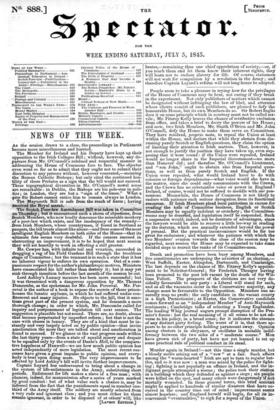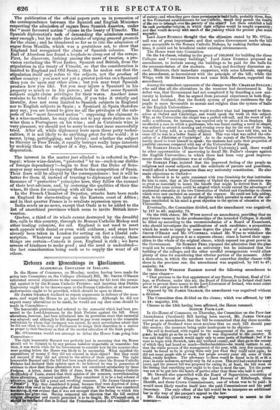Murder again in Ireland I—not this time a single murder,
but a bloody melee arising out of a " row " at a fair. Such affairs among the " warm-hearted " Irish are apt to turn to regular bat- tles, and so it was now : a man was seized by the police for fight- ing ; fighting is not popularly an offence in Ireland, and the in- dignant people attempted a rescue ' • the police took their station in a building which they defended as against a siege ; six people were killed on the spot, and many others were dangerously if net mortally wounded. In these general terms, this brief account might be applied to hundreds of similar disasters that have oc- curred in the country time out of mind : improvement Nikes almost hopeless ; and England herself will gin, for all its =- convenient "eventualities," to sigh for a re o the Union. The publication of the official papers puts us in possession of the correspondence between the Spanish and English Ministers respecting the admission of sugars from Spanish America, under the most favoured nation " clause in the treaty of Utrecht. The Spanish diplomatist's task of demanding the admission seemed easy enough ; but he made the mistake of urging general grounds for the claim • and he blundered so far as to cite the admission of sugar from Manilla, which was a gratuitous act, to show that England had recognized the claim of Spanish colonies. The Earl of Aberdeen has found a loophole to creep out of the scrape. First, he discovers, lurking among the mass of treaties, a pro- vision excluding the West Indies, Spanish and British, from the stipulation in the treaty of Utrecht, so that the consideration is limited to England and Old Spain ; then he makes out that the stipulation itself only refers to the subjects, not the produce of either country : you must not put a greater poll-tax on a Spaniard than you do upon any other alien ; but you may treat Spanish produce how you like. Yet you may injure a Spaniard in his property as much as in his person ; and in that sense Spanish subjects might claim privileges for their wares. Another issue remains to be tried : the stipulation, if you take it strictly and literally, does not seem limited to Spanish subjects in England nor to English subjects in Spain ; a Spaniard in Spain therefore may say, you are bound to give me all the privileges of the sub- jects of the "most favoured nation " : supposing the claimant to be a wine-merchant, he may claim not to pay more duties on his Wine than a Portuguese on his wine ; and as Catalonia wine is very pleasant, we should not be sorry to see that issue successfully tried. After all, while diplomacy rests upon these petty techni- calities, it is not likely to do anything great for the world : it is secret, lying, pettifogging, and trivial; and whether the subject be Slavery or Free Trade, it equally betrays really large interests by making them the subject of a dry, barren, and pragmatical disputation.



























